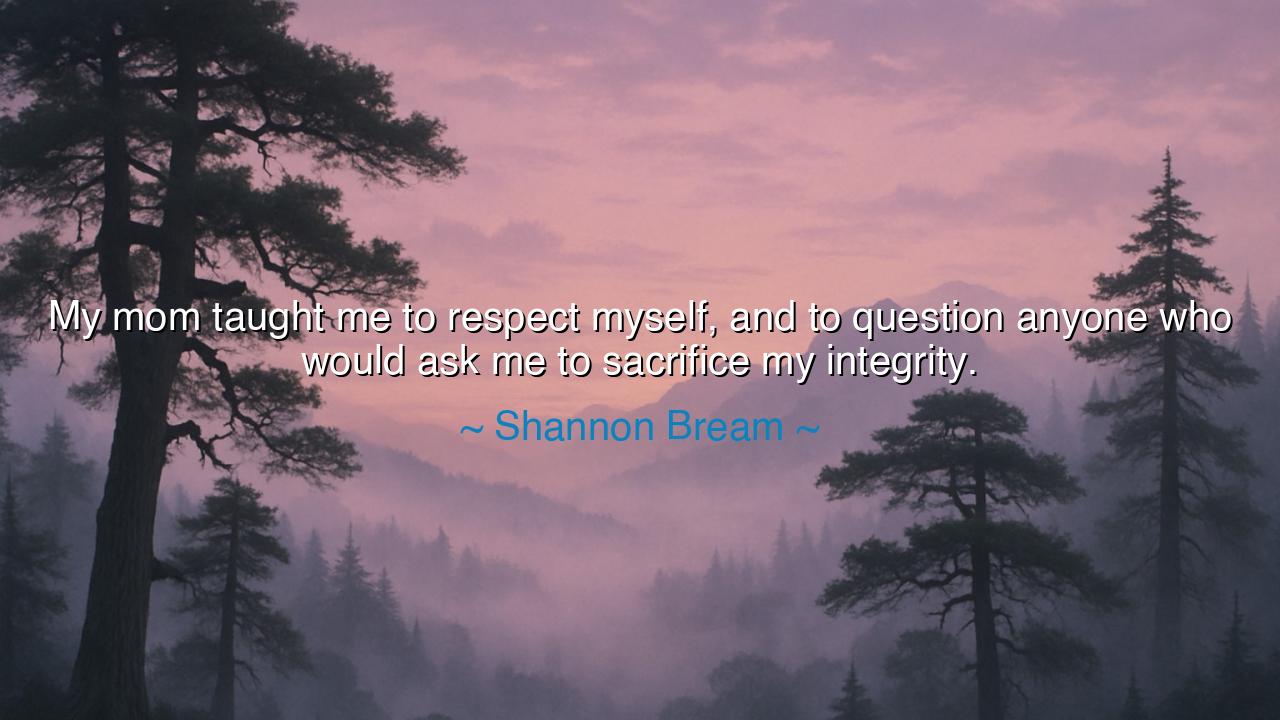
My mom taught me to respect myself, and to question anyone who
My mom taught me to respect myself, and to question anyone who would ask me to sacrifice my integrity.






When Shannon Bream said, “My mom taught me to respect myself, and to question anyone who would ask me to sacrifice my integrity,” she spoke a truth older than time itself — the law of honor, the first lesson of the soul. Her words carry the voice of generations of mothers and fathers who understood that a person’s worth is not measured by wealth or praise, but by the purity of their character. What she describes is not simply a mother’s advice, but a moral inheritance: the teaching that self-respect is the foundation of all dignity, and that integrity — once given away — can never be reclaimed whole. In her mother’s wisdom lives the echo of the ancients: “Guard thy soul more than gold, for from it springs the river of life.”
To respect oneself is to recognize the sacred light that dwells within. It is to stand firm in a world that constantly seeks to bend, buy, or break the human spirit. Bream’s mother taught her that this inner worth must never be surrendered — not for approval, not for advancement, not for comfort. For those who betray their integrity in pursuit of favor soon find themselves hollow, their victories tasting of ash. The ancients would have said: a person may lose their home, their fortune, even their health, and still rise again — but one who loses their integrity has lost the compass of the soul. Integrity is the anchor that holds the heart steady amid the tempests of ambition and fear.
The origin of this wisdom lies not in philosophy books or courts of power, but in the humble teachings of home — in the quiet moments where a parent shapes a child’s conscience. Shannon Bream, raised in faith and perseverance, was taught by her mother to weigh every demand against the scales of truth and self-respect. Her mother’s lesson was not a shield against the world, but a torch to guide her through it. For in every generation, the world will test the honest, offering rewards to those who compromise and punishment to those who stand firm. Her mother’s counsel was therefore both a warning and a blessing — a reminder that no reward is worth the price of one’s soul.
Consider the story of Socrates, the philosopher of Athens, who was condemned to die for speaking truth to power. Offered the chance to escape, he refused, saying that to defy the law — even unjustly applied — would betray the principles he had spent his life defending. Socrates chose death rather than dishonor, proving that integrity is stronger than fear. His legacy outlived his judges and accusers; his name became eternal because his conscience remained unbroken. This is the same moral lineage from which Bream’s mother spoke: that the voice of integrity is worth more than the applause of the crowd or the favor of kings.
Bream’s words also carry a subtle but profound challenge — to question anyone who would ask us to betray ourselves. In this, she reminds us that the path of virtue is not blind obedience, but discernment. We are not meant to yield to every command or conform to every expectation; we are meant to think, to weigh, to ask: “Does this demand honor or diminish me?” The ancients called this the art of judgment, the power to separate the righteous from the false. For there are always voices — seductive, commanding, persuasive — that will tell us that integrity is a luxury, that the ends justify the means. Yet every age proves the same truth: those who trade away their integrity for gain soon lose both.
The lesson of this quote, then, is both noble and practical. To live with integrity is not a grand gesture performed once, but a thousand small decisions made each day. It is in the refusal to gossip, the courage to speak truth, the strength to admit fault, the humility to stay honest even when no one is watching. To respect yourself is to live so that your reflection does not accuse you when you stand alone. To question those who would have you compromise your principles is to defend your sacred ground. For every person must one day stand before the mirror of their conscience — and that reflection will show either peace or regret.
And so, let these words be passed down like a family heirloom, as Bream’s mother passed them to her: Never sacrifice your integrity, for it is your truest treasure. In times of pressure, hold fast to what is right. In times of temptation, remember that no fleeting gain can equal the lasting calm of a clear conscience. The world may praise or reject you, but your soul — your sacred self — will know the truth. And when you live with such steadfast honor, you do not merely survive the trials of the world; you transcend them, as the ancients said, becoming not only a good woman or man, but a good human — the highest form of being.






AAdministratorAdministrator
Welcome, honored guests. Please leave a comment, we will respond soon